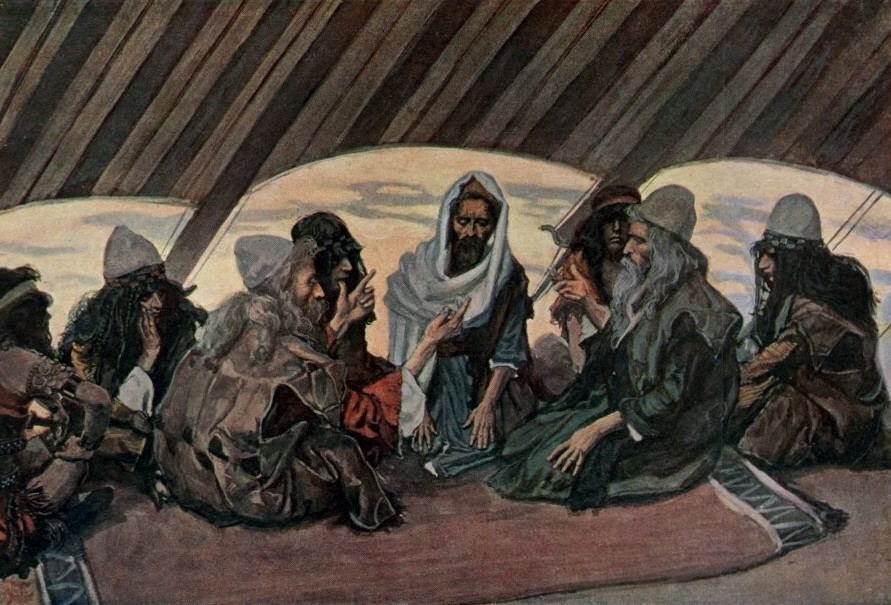The Humble Leader
June 21, 2016According to Numbers 12:3, Moses was more humble than anyone else on the face of the earth. What was it about Moses that caused this scribe (whom I take to be other than Moses) to come to such a lofty conclusion? No doubt, there are many examples of Moses’ humility in the Pentateuch, but let me point out three that are present in Exodus 18.
1. The humble leader shows respect to others. Moses was a big deal. He was God’s chosen instrument for leading the Israelites out of four centuries of slavery. He stood face to face against the most powerful man in the world (Pharaoh) and won. He was in charge of 2-3 million people, handling their complaints, leading them through the wilderness, and acting as the Supreme Court for their toughest disputes. Moses was the man.
And yet, when he was reunited with his family, he showed Jethro, his father-in-law the proper respect by going out to meet him, bowing down, and kissing him on the cheek. Moses then hosted Jethro in his tent and told him all that the Lord had done for Israel’s sake.
Of course, in one sense, this was all small potatoes. Moses was simply doing what would have been expected of him as a son (or son-in-law) in that culture. But the fact that Jethro is called Moses’ “father-in-law” twelve times in chapter 18 suggests that we are meant to see how Moses gladly accepted his role relative to Jethro. Good leaders understand that though they may have power, prestige, and position in certain areas, this does not mean they should expect to be feted and lauded wherever they go. We all inhabit a web of different relationships. True humility understands that no matter how important we may seem, we must still show proper deference and respect to those whose age or position require it.
2. The humble leader is willing to change. Again, it takes great humility to be in charge of as much as Moses was and still be willing to take advice from others. When it came to getting Israel organized for maximum effectiveness (and minimum frustration), Moses gladly listened to Jethro’s advice, even though he was only a visitor and a one-day old convert.
We would have been tempted to pull Zipporah aside later that night: “Listen, your dad is embarrassing me. He’s got to stop trying to tell me how to do my job. Last I checked, he’s been a priest of Midian his whole life, not the God-ordained prophet of Israel. Tell him to mind his own business.” But Moses didn’t complain, he didn’t get defensive, and he didn’t make excuses. He took his father-in-law’s counsel and instituted a massive overhaul to the spiritual and judicial life of Israel.
Here’s a good check for every leader, or really anyone at all: when is the last time you said, “That’s a good idea, let’s do it your way”? God is the only one who never changes his mind. He’s the only one whose ideas are perfect the first time around. For the rest of us, we must be willing to change–not always and not when it comes to truth, but probably more often than we think. At the very least, the humble leader knows how to incorporate the good ideas of those around him. He’s not too proud to admit, “You know what, that’s much better than the way I’ve been doing things.”
3. The humble leader doesn’t try to do everything himself. I love this paragraph from John Calvin:
Therefore let all, whether kings or magistrates, or pastors of the Church, know, that whilst they strain every nerve to fulfill their duties, something will always remain which may admit of correction and improvement. Here, too, it is worth while to remark, that no single mortal can be sufficient to do everything, however many and various may be the endowments wherein he excels. For who shall equal Moses, whom we have still seen to be unequal to the burden, when he undertook the whole care of governing the people? Let then, God’s servants learn to measure carefully their powers, lest they should wear out, by ambitiously embracing too many occupations.
Isn’t it interesting, Moses was tired in chapter 17, and he got two guys to help him keep doing the work. Now he’s tired again in chapter 18, but he needs men to help relieve the work. It takes wisdom to know the difference. When do I need support to keep pressing on? And when do I need to stop pretending this all depends on me? None of us is so significant that God can’t get things accomplished without us. As Calvin says a little later on in his commentary: “one ray of sun does not illuminate the world.”
Humility isn’t about pretending to be lower than we are. It’s about realizing we are not as mighty as we think. When we understand who we are—gifted, loved, and made in the image of God, but also flawed, weak, and wholly dependent upon God—we will naturally show respect, listen to others, and be eager to see those around us flourish. God is the ultimate sovereign, so we don’t have to be.
This content was originally published on The Gospel Coalition
